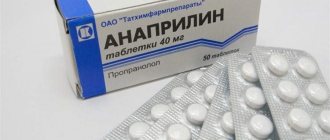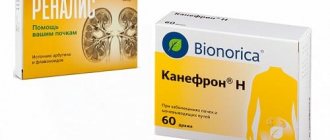Compound
According to the INN, all dosage forms of the drug Curantil include the active ingredient dipyridamole in different mass parts.
- 1 tablet of Curantyl 25 contains 25 mg of dipyridamole . Additionally: macrogol 6000, lactose monohydrate, polyvidone K25, corn starch, titanium dioxide, gelatin, carnauba wax, magnesium stearate, glucose syrup, talc, calcium carbonate, sucrose, light basic magnesium carbonate, quinoline yellow dye.
- 1 tablet of Curantil N 25 includes 25 mg of dipyridamole . Additionally (including shell): highly dispersed silicon dioxide, lactose monohydrate, macrogol 6000, sodium carboxymethyl starch (type A), talc, titanium dioxide, corn starch, hypromellose, gelatin, simethicone emulsion, magnesium stearate, quinoline yellow dye.
- 1 tablet of Curantil N 75 includes 75 mg of dipyridamole . Additionally (including shell): highly dispersed silicon dioxide, lactose monohydrate, macrogol 6000, sodium carboxymethyl starch (type A), talc, titanium dioxide, corn starch, hypromellose, gelatin, simethicone emulsion, magnesium stearate, quinoline yellow dye.
Pharmacodynamics and pharmacokinetics
The abstract for the drug positions Curantil as a vasodilating therapeutic agent with myotropic action, which has an inhibitory effect on platelet aggregation, improves microcirculation, and is also characterized by mild vasodilatory effectiveness.
The vasodilator effect of small doses of dipyridamole is selectively aimed at expanding the arterioles of the coronary circulation and, unlike calcium antagonists and organic nitrates, does not affect the larger vessels of this system. Taking high doses of dipyridamole leads to dilation of arterioles in other areas of the systemic blood flow, for which this medicine is used for the treatment and prevention of vascular pathologies of various types.
The vasodilator effectiveness of the drug is manifested due to two different mechanisms of its action, which consist in inhibiting the process of adenosine and suppressing the production of phosphodiesterase .
Due to the dynamic equilibrium observed between the release of adenosine and its reuptake, the intracellular content of this nucleoside is at the level of 0.15-0.20 µmol. When taking small doses of dipyridamole, inhibition of adenosine uptake by platelets , erythrocytes and endothelial cells is noted, which leads to an increase in its plasma concentration and increased adenosine-dependent vasodilation. High dosages of the drug inhibit platelet aggregation caused by the action of adenosine, thereby reducing the risk of thrombosis.
In turn, large doses of dipyridamole inhibit phosphodiesterases , which are responsible for the breakdown of cAMP and cGMP - effectors that influence the suppression of platelet aggregation. cGMP phosphodiesterase is suppressed . of cAMP synthesis increases .
Another feature of the effectiveness of dipyridamole, as a pyrimidine , is its ability to induce the production of interferon . In vitro, the drug has a modulating effect on the functionality of the interferon system and increases the initially reduced synthesis of alpha and gamma interferon by plasma leukocytes , thus increasing the nonspecific resistance of the human body to viral infections.
When administered orally with dipyridamole at a dose of 150 mg, the plasma TCmax of 2.66 μg/L is approximately 60 minutes. Binding to plasma proteins is almost complete. The greatest accumulation of the drug is observed in erythrocytes and the heart.
Metabolic transformations occur in the liver, for which the mechanism of binding dipyridamole with glucuronic acid . The average T1/2 is 20-30 minutes. In the form of a monoglucuronide, the drug is excreted in the bile.
Pharmacodynamics
Reduces the resistance of the coronary arteries at the level of small branches and arterioles, increases the number of collaterals and collateral blood flow; increases the concentration of adenosine and ATP synthesis in the myocardium, improves its contractility, reduces peripheral vascular resistance, lowers blood pressure, inhibits platelet aggregation (improves microcirculation, prevents arterial thrombosis), normalizes venous outflow; reduces cerebral vascular resistance, corrects placental blood flow; if there is a threat of preeclampsia, it prevents dystrophic changes in the placenta, eliminates hypoxia of fetal tissues, and promotes the accumulation of glycogen in them; has a modulating effect on the functional activity of the interferon system, increases nonspecific antiviral resistance to viral infections.
Indications for use
The main indications for use of Curantil include:
- treatment of dyscirculatory encephalopathy ;
- prevention and treatment of cerebral circulatory disorders of the ischemic type;
- treatment of any microcirculation disorders (in combination with other drugs corresponding to the pathology);
- prevention of coronary artery disease (primary and secondary), especially in case of personal intolerance to acetylsalicylic acid ;
- prevention of possible thromboembolism in the postoperative period of heart valve replacement ;
- prevention of the formation of venous and arterial thrombosis , as well as treatment of complications of thrombosis;
- prevention and treatment of acute respiratory viral infections and influenza (for a dosage of 25 mg), as an immunomodulator and interferon inducer.
Indications for use of Curantil during pregnancy include:
- prevention of placental ( fetoplacental ) insufficiency , fetal malnutrition and gestosis that occur during complicated pregnancy ;
- prevention of hypercoagulation and thrombus formation in the presence of varicose veins .
Effect of the drug
Let us list the effects that Curantil has on the body of the expectant mother:
- The circulatory system is strengthened;
- Blood circulation improves, in particular microcirculation;
- Thinning the blood is a good prevention of blood clots;
- Prevention of such symptoms in women: convulsions, migraines, swelling, high blood pressure, kidney problems;
- The immune system is strengthened - prevention of viral and colds during pregnancy;
- Prevention of fetoplacental insufficiency - protects the baby from hypoxia and developmental disorders.
The medicine is quickly eliminated from the body and is harmless. Many obstetricians prescribe it to their patients at the stage of pregnancy planning.
Contraindications
Contraindications to the use of Curantil are:
- unstable angina;
- myocardial infarction in the acute period;
- coronary arterial disease ( stenotic atherosclerosis );
- collapse;
- heart failure in the decompensation stage;
- subaortic stenosis;
- arterial hypotension;
- severe heart rhythm disorders;
- complicated arterial hypertension ;
- obstructive pathologies of the bronchopulmonary system of a chronic course;
- serious / kidney pathologies ;
- hemorrhagic diathesis;
- age up to 12 years;
- painful conditions that occur with an increased likelihood of bleeding;
- personal hypersensitivity to dipyridamole or other components of the drug.
In what cases is the drug prohibited?
Tablets Curantil 25 and Curantil 75 are strictly prohibited for the following diagnoses:
- Cardiovascular diseases: coronary heart disease, atherosclerosis of the arteries supplying the heart, angina pectoris, aortic stenosis, collapse, arterial hypo- and severe hypertension, severe arrhythmias;
- Decompensated heart failure;
- Chronic lung diseases;
- Chronic renal and liver failure;
- Diseases of the hemostatic system: hemorrhagic diathesis;
- Predisposition to bleeding;
- Patients with duodenal and gastric ulcers are at risk.
Individual intolerance to the components of the drug also excludes the use of Curantil 25 and 75.
In each case, the decision whether a woman can take pills or not is made by the attending physician, based on the test results and the general condition of the patient.
Side effects
The use of therapeutic dosages of Curantil rarely leads to the formation of negative phenomena, and even if they occur, the side effects of the drug are most often mild and transient.
The cardiovascular system:
- cardiopalmus;
- feeling of “hot flashes” on the skin of the face;
- tachycardia (especially when taking other vasodilating drugs in parallel);
- bradycardia;
- steal syndrome in relation to the coronary vessels (when taking daily doses of dipyridamole exceeding 225 mg);
- decrease in blood pressure.
Hemostasis system:
- functional changes in platelets;
- thrombocytopenia;
- development of bleeding;
- increased bleeding during or after surgical procedures (very rare).
Digestive system:
- epigastric pain;
- nausea , vomiting ;
- development of diarrhea .
With long-term therapy, gastrointestinal side effects usually disappear on their own.
Other:
- feeling of noise or fullness in the ears;
- dizziness;
- general weakness;
- facial hyperemia;
- headache;
- arthritis;
- rhinitis;
- myalgia;
- allergic manifestations ( rash / urticaria ).
conclusions
Curantil is a drug based on Dipyridamole, which inhibits the formation of a blood clot with long-term use and causes vasodilation when taken in high doses over a short course. If used incorrectly, severe side effects may occur. The drug is prescribed to pregnant women for the purpose of preventing or treating pathology of the fetus and the expectant mother. There are available analogues with the same active ingredient, as well as drugs with a similar effect with a different mechanism of action. To prescribe medication, a consultation with a cardiologist is necessary.
Curantil tablets, instructions for use
Instructions for use Curantyl 25
For the prophylactic purpose of ARVI and during influenza , a single daily dose of 50 mg of Curantyl 25 (2 pills or tablets) is usually prescribed, once every 7 days for 4-5 weeks (4-5 doses per course).
To prevent possible relapses of ARVI , especially for patients who often suffer from these infections, a daily dose of 100 mg (4 pills or tablets) in two stages (2 pills or tablets (50 mg)) with an interval of 120 minutes is indicated. The prophylactic course lasts 8-10 weeks with a single dose of the recommended dose of the drug every 7 days.
Instructions for use Curantyl 75
The daily dosage of Curantyl N 75 is selected taking into account the severity of the disease and the patient’s personal response to the treatment.
For the treatment of coronary heart disease , as a rule, a three-time dose of 75 mg of the drug per day is recommended (1 tablet every 8 hours). Based on the observed effectiveness, the physician may increase the daily dose.
To prevent thrombosis and for cerebral circulatory disorders, 3-6 tablets of Curantyl 75 mg are usually prescribed per day. In 24 hours, you can take a maximum of 450 mg of the drug.
In order to reduce platelet aggregation, Curantil is used in the daily dose range of 75-225 mg (1-3 tablets) in several doses. The maximum possible daily dosage of dipyridamole in severe cases is 600 mg.
Instructions for use of Curantil during pregnancy
When using Curantil during pregnancy , the selection of its dosage is carried out purely individually. A typical treatment regimen is to take 25 mg of the drug (1 pill or tablet) three times every 24 hours.
How to take - before or after meals?
For all of the above indications, Curantyl dragees and tablets are recommended to be taken on an empty stomach, without crushing or chewing the dosage forms, and with 100-150 ml of water.
, Germany. Literature
1. Ezra Y. et al. Therapy and prevention of thrombotic thrombocytopenic purpurea during pregnancy// American J. of Hematology.- 1996.- 51(1).- P. 1–6.
2. Hirose S. et al. The effect of nifedipine and dipyridamole on the doppler blood flow waveforms of umbilical and uterine arteries in hypertensive pregnant women// Asia Oceania J. of Obstetrics Gynecology.- 1992.- 18(2).- P. 187–193.
3. Rogov V.A. and others. Acetylsalicylic acid and chimes in the prevention of pregnancy complications with glomerulonephritis and hypertension // Therapeutic archive. - 1993. - 65(6). - P. 65–68.
4. Uzan S. et al. Idiopathic Recurrent Fetal Growth Retardation and Aspirindipyridamole Therapy// American J. of Obstetrics and Gynecology.- 1989.- 160(3).- P. 763–764.
Overdose
In cases of dipyridamole overdose the following was observed:
- the occurrence of angina and/or tachycardia ;
- decreased blood pressure;
- general weakness;
- feeling of "hot flashes";
- dizziness.
If symptoms of overdose are quickly detected, typical countermeasures will be effective, including inducing vomiting, cleaning the gastrointestinal tract, and taking sorbents. To stop the dilating effect of the drug, slow intravenous administration (50-100 mg/min) of Aminophylline . angina pectoris persist, sublingual administration of Nitroglycerin .
Interaction
Xanthine derivatives (including tea and coffee) may reduce the vasodilatory effectiveness of dipyridamole.
Antacids, due to decreased absorption of the drug, lower its maximum concentrations.
Parallel use with Aspirin and anticoagulants (thrombolytics, Heparin ) increases the possibility of bleeding.
Dipyridamole potentiates the effectiveness of antihypertensive drugs.
When combined with cholinesterase inhibitors, a decrease in their anticholinergic properties is observed.
Combined use with cephalosporin antibiotics ( Cefoperazone , Cefamandole , Cefotetan ) can lead to increased antiplatelet effects.
Adverse reactions when taking tablets
Curantil 75 and 25 are not vitamins, but a serious drug. Therefore, if taken incorrectly and individually, it can cause negative reactions. Therefore, if you notice any of the symptoms that we list below, contact your doctor:
- The pulse quickened;
- Blood rushes to the face, heat;
- The heart rhythm is disturbed - bradycardia or tachycardia begins;
- Stomach pain, vomiting or diarrhea;
- Feeling dizzy or dizzy, or having tinnitus;
- Drowsiness, weakness, bronchospasm appeared;
- An allergic reaction has appeared: skin rash or itching, urticaria, rhinitis.
To reduce the risk of adverse reactions, follow these recommendations.
How to minimize negative reactions
First, do not take the medicine if you are at risk. Especially if you have acute problems with the cardiovascular system, lungs, kidneys, or liver. We have already talked about this above.
Secondly, take a coagulogram. This test will evaluate blood clotting. It is especially important to take it to women with peptic ulcer disease.
Thirdly, during the course, give up tea, coffee and products that contain it. They not only reduce the effectiveness of the drug, it generally does not combine well with caffeine. Moreover, coffee is also harmful to your unborn baby.
Fourth, take the drug under the strict supervision of a doctor if you have genital herpes, ARVI and other infections that often recur. In this case, you need to regularly monitor your blood clotting parameters.
Fifth, take the tablets with milk. This will help reduce the risk of developing an allergic reaction.
If you take any medications on a regular basis, be sure to inform your gynecologist. Since some drugs may affect the effectiveness of Curantil. For example, acetylsalicylic acid enhances its effect, and caffeine reduces it.
Curantyl is also prescribed in combination with Actovegin.
Analogs
Level 4 ATC code matches:
Persantine
Aegitromb
Plavix
Coplavix
Cardiomagnyl
Polocard
Thrombo ACC
Brilinta
Magnicor
Plagril
Dipyridamole
Clopidogrel
Lopirel
Sylt
CardiASK
Aspirin Cardio
Acecardole
Aspinat
Aspicor
Curantil analogues are represented by a fairly wide list of drugs similar to it in their main anticoagulant and antiplatelet effects. The most famous analogues are:
- Aspirin Cardio
- Aspicor
- Aspecard
- Sylt
- Atherocardium
- Godasal
- Atrogrel
- Cardiomagnyl
- Brilinta
- Clopidogrel
- Disgren
- Plagril
- Magnicor
- Plavix
- Trombonet
The price of Curantil analogues depends on the manufacturer, the number of tablets and the mass content of the active ingredient in them and therefore varies within fairly wide limits. For example, Aspirin Cardio 100 mg No. 20 can be purchased on average for 130 rubles, Clopidogrel 75 mg No. 28 for 500 rubles, and Plavix 75 mg No. 28 for 2,600 rubles.
Drug analogues: what can be replaced?
There are absolute analogues of Russian-made Kurantil. This means that both drugs contain the same active ingredient. The domestic generic is even called “Dipyridamole”. The difference between them is in the features and place of production, additional components and price, since the Russian product is cheaper than the imported one. Other medicines with Dipyridamole: Persantine (Spain), Parsedil, Sanomil-Sanovel.
If you are intolerant of Curantil, it is recommended to raise the question of taking other drugs with an antiplatelet effect:
Based on acetylsalicylic acid: Aspicor, Aspirin Cardio, Aspecard. Since drugs in this group, by blocking the synthesis of thromboxane A2, have an ulcerogenic effect (potentiating the development of gastric ulcers), they are not recommended for patients with gastritis or peptic ulcers, and for elderly people or patients at risk of complications, it is preferable to use drugs with magnesium ( Cardiomagnyl, Magnikor).- Based on Clopidogrel: Zilt, Plagril, Trombonet. Egitromb, Plavix. The mechanism of action of the substance is the binding of ADP (adenosine diphosphate) to the surface of the platelet and its subsequent activation by the GPIIb/IIIa complex, as a result of which blood cell aggregation decreases.
- Other substitutes: Dysgren (1 capsule contains 0.3 g of Triflusal - an inhibitor of platelet cyclooxygenase from the arachidonic acid cycle); Brilinta (Ticagrelor and Mannitol).
Chimes during pregnancy and lactation
The practice of prescribing Curantil during pregnancy exists mainly in the post-Soviet countries, where gynecologists have been using the positive properties of this drug for quite a long time and quite successfully.
Sometimes this drug is prescribed even when planning pregnancy , if a woman who wants to become pregnant experiences various painful conditions associated with impaired blood circulation, microcirculation, or an increased tendency to form blood clots. The daily dosage of such pathologies, according to the instructions for use, is selected individually and can reach 450 mg, so it would be advisable to use Curantil N 75. Another advantage of such preventive therapy, of course, is the ability of dipyridamole to increase the body's resistance to various infections by stimulating the production of interferon .
During pregnancy itself, the prescription of any medications must be approached strictly individually and with extreme caution, and therefore, before taking Curantil during pregnancy, it is necessary to completely eliminate contraindications and possible risks of therapy for both the expectant mother and the fetus. When to start treatment, at what stage to carry out therapy and for how long to take the drug, the gynecologist should determine it, in accordance with the patient’s medical history and her current condition.
In cases where the expectant mother has pathologies associated with blood circulation or thrombus formation, which could potentially lead to pregnancy complications in the future, drug treatment may be simply necessary, for which Curantil is prescribed to pregnant women in the early stages. In this case, the dosage of the drug can be quite significant, which increases the risk of bleeding and requires special attention from medical personnel.
In the later stages of pregnancy, the development of negative phenomena is often noted, arising, among other things, due to insufficient microcirculation (including swelling , toxicosis , headaches , increased blood pressure, convulsions, etc.). Solving such problems is also among the indications for the use of Curantil, for which it is prescribed to pregnant women most often in minimal doses (25 mg 2-3 times every 24 hours) and, depending on the severity of the observed negative symptoms, in courses of varying duration. In some cases, such treatment continues throughout pregnancy with short breaks and stops immediately before birth.
In the second trimester of pregnancy placental insufficiency - a complication characterized by impaired blood supply to the placenta and can lead to fetal hypoxia, delayed development, and sometimes spontaneous abortion . Therapeutic courses with the prescription of Curantil N 25 (1 tablet 2-3 times a day) in most cases prevent the development of this complication or significantly reduce its manifestations, without having any effect on the fetus.
Indications for the use of Curantil during pregnancy in the 3rd trimester are placental insufficiency and gestosis ( late toxicosis ), in which the drug, by improving blood supply to the placenta, helps the final full formation of the brain, lungs and other organs of the unborn child, and also significantly reduces the negative impact of these complications on its mother. Sometimes, in severe cases of gestosis and/or placental insufficiency, the effects of one drug may not be enough, for which purpose complex therapy using several drugs is prescribed during pregnancy, for example, Actovegin and Curantil. The improvement in tissue trophism and regeneration, as well as metabolism, inherent in Actovegin , perfectly complements the vasodilating effects of Curantil, thereby protecting the female body from many negative painful manifestations, including the threat of miscarriage .
It is important to remember that at any time you can demand from your doctor comprehensive explanations to questions about why this or that drug is prescribed to pregnant women, how to drink or administer the prescribed dosage form, what dosages to follow, what positive aspects, and most importantly, negative consequences this treatment can lead to. treatment and why it is prescribed to you. In this regard, you should not rely on reviews about Curantil during pregnancy left on various Internet resources, since there is no guarantee that your situation is similar to those described by other women. It is also necessary to thoroughly find out all the possible side effects of the drug and methods of preventing their occurrence, scrupulously monitor your well-being and undergo regular examinations on time.
The possibility of using Curantil during breastfeeding is determined by the doctor.
Benefits of Kurantil for mother and baby
The drug normalizes microcirculation, nourishing and enriching every cell with oxygen. It does not pass through the placental barrier, which means it does not harm the baby. At the same time, it has a beneficial effect on the blood vessels of the placenta, and it is through them that the fetus receives everything it needs for growth and development.
Therefore, gynecologists prescribe the drug to expectant mothers. Many women consider it an ordinary vitamin, although this is far from the case: this is a serious medicine that can only be prescribed by a specialist after examinations and if indicated.
Reviews about Kurantil
Due to the fairly frequent prescription of this drug to pregnant women, the prevailing number of reviews about Curantyl N 25 on forums are left by mothers who have ever taken it, while reviews about Curantyl during pregnancy in most cases can be divided into positive and neutral.
Although some side effects of the drug are occasionally mentioned, including flushing , palpitations and headaches, purely negative assessments, except in cases of personal hypersensitivity to the ingredients of the drug, are practically never found. Conversely, there are enough positive reviews of the effectiveness of Curantil to at least consider the issue of its use. Naturally, the prescription of Curantil should be clearly reasoned and thought out, and its dosage and number of doses should be reduced to the required minimum.
Also, many women, having heard about the prescription of this drug, try to find explanations for themselves about the expediency and safety of its use, using the Internet, whereas the correct thing to do would be to clarify this issue with their attending physician, who is simply obliged to provide all the information that interests you.
When is Curantil necessary?
According to the instructions, tablets are prescribed if a woman has a history of the following health problems:
- increased blood clotting, proven by tests - the risk of blood clots, the blood needs to be thinned;
- varicose veins - increased risk of swelling and blood clots;
- Previously, the woman could not bear a child, for example due to a miscarriage;
- atherosclerosis. Cholesterol is deposited on the vessels, which also risks the formation of blood clots in this area;
- cardiovascular diseases. To protect a pregnant woman from a heart attack or stroke, she is prescribed Curantil 25 or 75.
Admission is indicated for placental insufficiency, deterioration of blood supply to the kidneys, uterus and other organs, as well as for postterm pregnancy.
Curantila price, where to buy
The average cost of all dosage forms of this drug can sometimes vary depending on the region and pharmacy chain, but generally it is approximately at the same level. For example, you can buy 100 tablets of Curantil 25 in Moscow for about the same price as 25 mg of the same drug No. 100 costs in St. Petersburg.
- The price of Curantil 25 (100 tablets of 25 mg), most often prescribed as an immunomodulator, is about 900 rubles.
- The cost of Curantil N 25 No. 120 tablets, traditionally used during pregnancy, varies between 800 rubles.
- The price of Curantil N 75 No. 40 tablets, usually used for the prevention and treatment of pathologies of the circulatory system, fluctuates around 1,700 rubles.
- Online pharmacies in RussiaRussia
- Online pharmacies in KazakhstanKazakhstan
ZdravCity
- Curantil tablets p.p.o.
25 mg 120 pcs. JSC "Berlin-Pharma" 795 rub. order - Curantil N 75 tablets p.p.o. 75 mg 40 pcs. JSC "Berlin-Pharma"
RUR 935 order
Pharmacy Dialogue
- Curantil N75 tablets 75 mg No. 40Berlin-Chemie AG/Menarini
RUB 1,746 order
- Curantil N 25 (tablet p/o 25 mg No. 120)Berlin-Chemie AG/Menarini
RUR 775 order
show more
Curantil: composition and mechanism of action
It is an antiplatelet agent and immunomodulator. The drug, by normalizing microcirculation, avoids many complications during pregnancy. Among them are gestosis, migraines, pressure fluctuations and other health problems in women, hypoxia and intrauterine fetal death, early aging of the placenta, and premature birth.
The active ingredient is dipyridamole. It improves immunity and protects the expectant mother from harmful bacteria and viruses, prevents thrombosis, and stimulates the production of interferon.
It has the form of a yellow dragee. There are 2 options for tablets in pharmacies:
- Curantil 25 - it contains 25 mg of active substance;
- Curantil 75 - respectively, 75 mg.
In this article we will tell you everything about Curantil: how to take it, when it can be done, and when it is strictly prohibited, about the effectiveness and action of the drug, its analogues.
To improve blood flow in the placenta
Pregnant women are susceptible to thrombosis due to hormonal imbalance and metabolic disorders. Chronic diseases, such as heart and blood vessels, and high cholesterol levels also increase the risk. Blood clots clog blood vessels and block blood access to the placenta. And the unborn child suffers from a lack of oxygen, and there is a high risk of complicated pregnancy and labor.
Under the influence of the drug, the walls of blood vessels relax, blood circulation improves, blood flows better to the placenta - enough nutrients and oxygen reach the fetus, and it grows and develops fully.
To prevent late toxicosis
Another reason to take medicine is the prevention of gestosis, or toxicosis in the 2nd 3rd trimester. This is a serious condition that is dangerous for both the woman and her child. Therefore, if there are signs or risk of developing gestosis, it is necessary to prevent the deterioration of the pregnant woman’s condition.
To protect against viral diseases
The body of the expectant mother is susceptible to virus attack, especially when pregnancy occurs in the autumn-spring period. In turn, temperature and other signs of a viral disease can negatively affect the further development of the child. This is why it is so important for a woman to protect herself from infection - taking Curantil makes it easier for the expectant mother to resist seasonal diseases.








